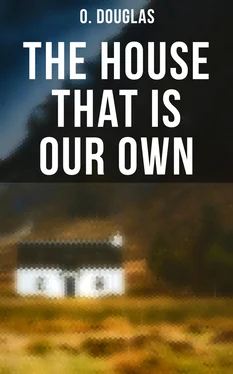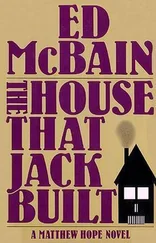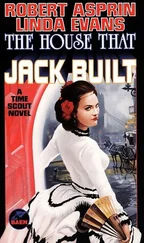O. Douglas - The House That is Our Own
Здесь есть возможность читать онлайн «O. Douglas - The House That is Our Own» — ознакомительный отрывок электронной книги совершенно бесплатно, а после прочтения отрывка купить полную версию. В некоторых случаях можно слушать аудио, скачать через торрент в формате fb2 и присутствует краткое содержание. Жанр: unrecognised, на английском языке. Описание произведения, (предисловие) а так же отзывы посетителей доступны на портале библиотеки ЛибКат.
- Название:The House That is Our Own
- Автор:
- Жанр:
- Год:неизвестен
- ISBN:нет данных
- Рейтинг книги:3 / 5. Голосов: 1
-
Избранное:Добавить в избранное
- Отзывы:
-
Ваша оценка:
- 60
- 1
- 2
- 3
- 4
- 5
The House That is Our Own: краткое содержание, описание и аннотация
Предлагаем к чтению аннотацию, описание, краткое содержание или предисловие (зависит от того, что написал сам автор книги «The House That is Our Own»). Если вы не нашли необходимую информацию о книге — напишите в комментариях, мы постараемся отыскать её.
The House That is Our Own — читать онлайн ознакомительный отрывок
Ниже представлен текст книги, разбитый по страницам. Система сохранения места последней прочитанной страницы, позволяет с удобством читать онлайн бесплатно книгу «The House That is Our Own», без необходимости каждый раз заново искать на чём Вы остановились. Поставьте закладку, и сможете в любой момент перейти на страницу, на которой закончили чтение.
Интервал:
Закладка:
“I’m rather glad,” said Isobel, “that there’s no one ‘to take me up.’ I’ll be entirely on my own, and if I need help or advice, there’s always Agnes Home, Merchant. But it’s to be hoped that a woman of thirty, large and muscular and sane, can look after herself! Have you seen anything of your neighbours?”
“Have I not,” said Kitty. “The ‘retired couple’ called yesterday. They have no family, and when Mr. Boothby retired (he is—or was—a barrister), they got rid of their house and settled in here. They go away for the summer, so they told me, so it suits them very well. They’re both very easy to get on with, smiling and agreeable. There must be thousands of such couples in London. Mrs. Boothby dresses well, and looks after her hair and complexion. They were very nice about noticing things, picking out this and that to admire. I’m sure they will be pleasant neighbours, though I doubt at the end of a year if I’ll know them any better than I do now.”
“They sound ideal flat dwellers,” said Isobel.
“Mrs. Temple, on the ground floor,” Kitty went on, “sent up a note asking if I’d waive ceremony and call on her. I went at once, and found a real old lady, a thing I thought had vanished from the world in these days of night-club-haunting grandmothers. White hair, and a cap—a cap, I ask you—the most seductive thing in cream lace, and a black silk dress and shawl. Eighty-five, she told me she was, and so pretty, with a pink and white face, and blue eyes hardly faded at all. She’s been a widow for twenty-five years, has had six children, and lived a very busy life until, five years ago, she broke her leg, since when she has been more or less a prisoner in the house. But she still knits, and collects for her pet charities, and keeps herself very contented.”
“Where are all her family?”
“Oh, I heard all about them. Two sons were killed in the War, the third is in London, I think she said in business. The three daughters are married; one, the youngest, is in China with her diplomatic husband; one married a man in the I.C.S., now retired and living in Devon; the third I got no information about except what I gathered from the fact that she was alluded to with a sigh as ‘Poor Monica.’ ”
“You must have had quite an entertaining visit,” said Isobel.
“I had. I protested that I must be tiring Mrs. Temple, but she really seemed to enjoy telling me all about everything as much as I enjoyed listening. She is what in Scotland we call ‘innerly.’ Just the opposite to the Boothbys. You can cry and laugh with Mrs. Temple and talk about real things without embarrassment. Pleasant as the Boothbys are, you’d never think of talking to them of anything but surface things. In ten minutes I felt as if I’d known Mrs. Temple all my life.”
Isobel was thinking over that conversation, as she looked on the Westmorland hills, and wondered how she could have been so foolish as to spend so many spring days in a crowded city, missing so much. Kitty would be quite happy with a circle of old friends, and Mrs. Temple to visit daily and devise interests and amusements for. She wouldn’t miss her friend of the Queen’s Court Hotel, except just at first. Isobel realised, without bitterness, that nobody would miss her much. Patty, a bit, perhaps, when she got depressed about Jack’s helplessness. (By the way, she must remember to send Patty’s jumper-knitter any ideas she had.) The Hospital people had said she would be a loss, for she had been dependable, but she had got a girl to promise to take her place there; and various lonely people might feel a little more solitary because her visits had stopped, but these she could write to from time to time. In a way, Isobel thought, it was rather a good thing to be alone, to have no-one to worry about, though, she admitted, it must be rather wonderful to have people of one’s own, whom one had a right to agonise over, to rejoice over.
A short stop at Carlisle, and they were over the Border. Lockerbie, Beattock, the uplands of the Clyde, and then, at last, Symington, the station at which she had to change.
The guard of the train, who had shown a fatherly interest in her from Euston, came to her help, and soon she was standing among her boxes on a windswept platform. She pulled up the collar of her coat, for though the sun was still bright the May air was snell, and asked the porter when and where she got a train for Glenbucho.
“Ower the bridge,” she was told. “It’s the Tinto Express frae Glesgae that ye get. She’ll be in in anither twenty minutes. I’ll bring yer luggage.”
For half an hour Isobel walked up and down the platform, wondering what this exposed station, lying among moorlands, would be like in winter, when the land was held in icy grip, and blizzards swept down from the hills. It must be fine, thought the city-bred girl, with a thrill at her heart.
At last the Glasgow train came in, and away they went. It was a soft pastoral country she saw, rounded green hills and spreading fields, farm-houses and white-washed cottages; here and there the glint of water. One and another small flowery station was passed, till they pulled up at Glenbucho.
To the porter who came to collect her luggage, Isobel said, “I’m going to Glenbucho Place. D’you know if there’s anyone meeting me?”
The porter nodded his head towards the gate, and said, “Aye, Jardine’s man’s here wi’ the big car. Wait you here an’ I’ll get a barra’.”
“Jardine’s man” was called Dan, a friendly person who fitted Isobel and her belongings into the shabby Daimler, and with a parting salutation from the porter of, “Weel, that’s a’ richt, then,” they were off.
Glenbucho Place was about a mile from the village, and the grieve’s house, Isobel found, stood beside the stackyard, some distance from the cottages of the shepherd and the ploughman, and had a neat garden in front, at present bright with wallflowers, forget-me-nots, and tulips.
As the car stopped, a middle-aged woman came down the path to the gate, and, holding out her hand, said, “You’ll be Miss Logan. Come awa’ in, and Dan’ll bring the luggage. Ye’ve had a lang journey, a’ the way frae London. What the’s weather like there?”
“Rather stormy,” said Isobel; “it’s to be hoped it clears before the Coronation. You know London?”
Mrs. Bruce seemed almost affronted at the question, and said hastily, “No’ me. I’ve never had the time for gallivantin’, nor the money either. But a’body travels now whether they can afford it or not. It’s thae motor-cars and buses and things that make folk restless. I was born two miles from here, and I’ve never been further than Glasgow and Edinburgh, and once to Melrose when the Big Show was there.”
“Will I carry up the boxes, Mrs. Bruce?” the chauffeur asked.
“Aye, ye might, Dan. Davy’s no’ back from Lanark yet.”
Isobel opened her purse and was startled when Mrs. Bruce hissed in her ear, “A shilling’s plenty, mind.”
Feeling that she must not allow herself to be intimidated, Isobel took out half a crown, and handed it with a smile to Dan, who was not out of earshot when Mrs. Bruce entered her protest.
“There was no sense in giving him half a crown, when a shilling was plenty. It’s a pity to spoil folk.”
“But he carried up my boxes,” Isobel said.
“And what for no’? . . . Here’s your room. And here’s the bathroom. Hot and cold,” she added proudly.
“Oh, the window looks out on the hillside,” Isobel cried. “I’m so glad it isn’t obscured glass.”
“Nobody’ll see you but the sheep,” Mrs. Bruce assured her. “They wanted to put in that kinda glass, but I wouldna have it. It’s dearer, anyway.”
“This looks like a new bathroom.”
Читать дальшеИнтервал:
Закладка:
Похожие книги на «The House That is Our Own»
Представляем Вашему вниманию похожие книги на «The House That is Our Own» списком для выбора. Мы отобрали схожую по названию и смыслу литературу в надежде предоставить читателям больше вариантов отыскать новые, интересные, ещё непрочитанные произведения.
Обсуждение, отзывы о книге «The House That is Our Own» и просто собственные мнения читателей. Оставьте ваши комментарии, напишите, что Вы думаете о произведении, его смысле или главных героях. Укажите что конкретно понравилось, а что нет, и почему Вы так считаете.




![Альфред Ван Вогт - Вечный дом / The House that Stood Still [= А дом стоит себе спокойно…; Обитель вечности]](/books/276568/alfred-van-vogt-vechnyj-dom-the-house-that-stood-thumb.webp)







